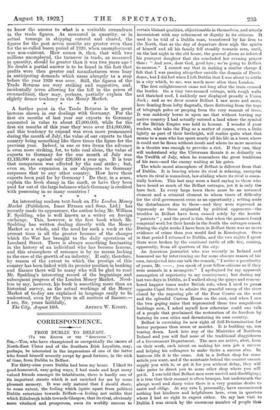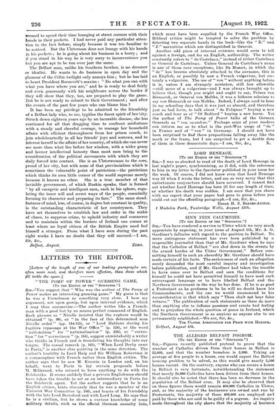CORRESPONDENCE.
FROM DUBLIN TO BELFAST.
(TO THE EDITOR Or THE " SPECTATOR."] SIR,—You, who have championed so energetically the causes of North-East Ulster and of the Southern Irish Loyalists, may, perhaps, be interested in the impressions of one of the latter who found himself recently swept by good fortune, in the nick of time, from Dublin to Belfast.
For thirty-nine years Dublin had been my home. I liked its good-humoured, easy-going ways, I had made and kept many valued friends amongst its inhabitants, there is hardly one of its important streets which is not enriched for me by some pleasant memory. It was only natural that I should share, to some extent, the feeling which (quite apart from politics) Dublin entertains towards Belfast—a feeling not nntik-e that which Edinburgh holds towards Glasgow, that its rival, obviously more vitalized and prosperous, owes its worldly success to certain blatant qualities, objectionable in themselves, and utterly inconsistent with any refinement or dignity in its citizens. It used to be told of a Dublin man, transferred by his firm to the North, that as the day of departure drew nigh the spirits of himself and all his family fell steadily towards zero, until, on the last night in the old house, the general gloom so infected his youngest daughter that she concluded her evening prayer thus : " And now, dear God, good-bye ; we're going to Belfast to-morrow." I cannot say that in making a similar change I felt that I was passing altogether outside the domain of Provi- dence, but I did feel when I left Dublin that I was about to settle in a city which, to me, was much more alien than London.
The first enlightenment came not long after the train crossed the border. On a tiny two-roomed cottage, with rough walls and thatched roof, I suddenly saw displayed proudly a Union Jack ; and as we drew nearer Belfast I saw more and more, here floating from lofty flagstaffs, there fluttering from the tops of telegraph poles or peeping from the very summit of trees. It was suddenly borne in upon me that without leaving my native country I had actually entered a land where the symbol of the British Empire was held in honour. I wonder if your readers, who take the Flag as a matter of course, even a little lightly as part of their birthright, will realize quite what that means to a man who has spent nearly all his life in a town where it could not be flown without insult and where its mere mention in a theatre was enough to provoke a riot. If they can, they will understand why the 'Ulsterman flaunts it so defiantly on the Twelfth of July, when he remembers the great traditions of his race—and the enemy waiting at his gates.
The whole moral atmosphere of Belfast is different from that of Dublin. It is bracing where its rival is relaxing, energetic where its rival is somnolent, law-abiding where its rival is essen- tially lawless. This last may seem a hard saying to those who have heard so much of the Belfast outrages, yet it is only the bare fact. In every large town there must be an untamed element and a criminal element to whom times of difficulty for the civil government come as an opportunity ; setting aside the disturbances due to these—and they were repressed as vigorously as those originated by political opponents—the troubles in Belfast have been caused solely by the hostile " patriots " ; and the proof is this, that when the gunmen found congenial work for their hands in the South the outrages ceased. During the eight weeks I have been in Belfast there was no more evidence of crime than you would find in Kensington. Once in that period I returned to Dublin, and the two nights I spent there were broken by the continual rattle of rifle fire, coming, apparently, from all quarters of the city.
An American journalist who was recently in Ireland and honoured me by interviewing me for some obscure reason of his own, interjected into our talk the remark, " I notice a peculiarity of yours, Mr. —, you speak of your fellow-citizens as if they were animals in a menagerie." I apologized for my apparent assumption of superiority to my countrymen ; but during my last two days in Dublin, as I walked along the quays and remem- bered happier times under British rule, when I used to pause opposite Capel Street to admire the graceful sweep of the river closed by the imposing pile of the Four Courts on the west and the splendid Custom House on the east, and when I saw the two gaping ruins that represented these two magnificent buildings now, I asked myself how otherwise could one talk of a people that proclaimed the restoration of its freedom by burning its own cities and devastating its own country.
Belfast is exercising its new right of Self-Determination for better purposes than arson or murder. It is building up, not tearing down. Look into any of the Ministries of Northern Ireland and you will find none of the traditional sluggishness of a Government Department. The men are active, alert, keen on their work, each intent on making his own job a success and helping his colleagues to make theirs a success also. In business life it is the same. Ask in a Belfast shop for some article you want, and if the assistants behind the counter cannot supply you with it, or get it for you without delay, they will take pains to direct you to some other shop where you will get it. I was told that Belfast men were uncivil and disobliging ; it is true that their manner is often brusque, but underneath the abrupt word and sharp voice there is a very genuine desire to FuNist and oblige. At any rate I, personally, have encountered nothing but kindness and helpfulness here, even in quarters where I had no right to expect either. On my last visit to Dublin I was struck by the enormous number of people that
seemed to spend their time lounging at street corners with their bands in their pockets. I had never paid any particular atten- tion to the fact before, simply because it was too familiar to be noticed. But the Ulsterman does not lounge with his hands in his pockets ; he is going about his business in a hurry ; and if you stand in his way he is very sorry to inconvenience you but you are apt to be run over just the same.
The Belfast man, unlike his Southern brother, is no dreamer or idealist. He wants to do business in open day and the glamour of the Celtic twilight only annoys him ; but he has laid to heart President Roosevelt's maxim : " Do what you can with what you have where you are," and he is ready to deal fairly and even generously with his neighbours across the border if they will show that they, too, are prepared to play the game. But he is not ready to submit to their Government ; and after the events of the past few years who can blame him ?
It has been my privilege to be admitted to the friendship of a Belfast lady who, to me, typifies the finest spirit of her city. Struck down eighteen years ago by an incurable disease, she has continued for all that dragging time to confront misfortune with a steady and cheerful courage, to manage her household affairs with efficient thoroughness from her prison couch, to join wholeheartedly in all her friends' joys and sorrows, and to interest herself in the affairs of her country, of which she can never see more than what lies before her window, with a wider grasp and keener intellectual honesty than most men bring to the consideration of the political movements with which they are daily forced into contact. She is an Ulsterwoman to the core, proud of her city, but with none of that provincialism which is sometimes the vulnerable point of patriotism—the patriotism which thinks its own little corner of the world supreme merely because it knows no other. She is a true member of that invisible government, of which Ruskin speaks, that is formed " by all energetic and intelligent men, each in his sphere, regu- lating the inner will and secret ways of the people, essentially forming its character and preparing its fate." The same stead- fastness of mind, less, of course, in degree but constant in quality, is the outstanding characteristic of her countrymen. They have set themselves to establish law and order in the midst of chaos, to suppress crime, to uphold industry and commerce and to maintain within the borders of Ireland one corner at least where no loyal citizen of the British Empire need feel himself a stranger. From what I have seen during the past eight weeks I have no doubt that they will succeed.—I am, Sir, 8co.,



































 Previous page
Previous page